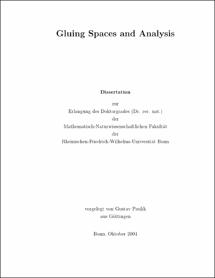Paulik, Gustav: Gluing Spaces and Analysis. - Bonn, 2005. - Dissertation, Rheinische Friedrich-Wilhelms-Universität Bonn.
Online-Ausgabe in bonndoc: https://nbn-resolving.org/urn:nbn:de:hbz:5N-04831
Online-Ausgabe in bonndoc: https://nbn-resolving.org/urn:nbn:de:hbz:5N-04831
@phdthesis{handle:20.500.11811/2126,
urn: https://nbn-resolving.org/urn:nbn:de:hbz:5N-04831,
author = {{Gustav Paulik}},
title = {Gluing Spaces and Analysis},
school = {Rheinische Friedrich-Wilhelms-Universität Bonn},
year = 2005,
note = {In the first part of this work we study the gluing of metric measure spaces. The gluing is defined by a bilipschitz map which identifies the gluing sets. The new metric is given by the minimal length of all possible paths on the glued space. On each of these spaces a strongly local, regular Dirichlet form is defined. Additionally, each space satisfies a doubling property and a strong scaling invariant Poincaré inequality for all balls holds true. We derive the doubling property and the scaling invariant Poincaré inequality on the glued space provided a lower bound on the "heat transmission coefficient" for certain sets holds true. For the proof only assumptions on the Dirichlet forms on the separate pieces are used.
These results imply upper and lower Gaussian estimates on the heat kernel, short-time asymptotics and the Feller property of the associated process on the glued space.
In the second part we give some generalizations of results by Charles Amick. These are characterizations of the validity of the Poincaré inequality and of Rellichs compact embedding theorem on a domain in terms of a quantity extracted from the boundary. We prove characterizations of this kind for strongly local regular Dirichlet forms on metric measure spaces which satisfy a scaling invariant Poincaré inequality.},
url = {https://hdl.handle.net/20.500.11811/2126}
}
urn: https://nbn-resolving.org/urn:nbn:de:hbz:5N-04831,
author = {{Gustav Paulik}},
title = {Gluing Spaces and Analysis},
school = {Rheinische Friedrich-Wilhelms-Universität Bonn},
year = 2005,
note = {In the first part of this work we study the gluing of metric measure spaces. The gluing is defined by a bilipschitz map which identifies the gluing sets. The new metric is given by the minimal length of all possible paths on the glued space. On each of these spaces a strongly local, regular Dirichlet form is defined. Additionally, each space satisfies a doubling property and a strong scaling invariant Poincaré inequality for all balls holds true. We derive the doubling property and the scaling invariant Poincaré inequality on the glued space provided a lower bound on the "heat transmission coefficient" for certain sets holds true. For the proof only assumptions on the Dirichlet forms on the separate pieces are used.
These results imply upper and lower Gaussian estimates on the heat kernel, short-time asymptotics and the Feller property of the associated process on the glued space.
In the second part we give some generalizations of results by Charles Amick. These are characterizations of the validity of the Poincaré inequality and of Rellichs compact embedding theorem on a domain in terms of a quantity extracted from the boundary. We prove characterizations of this kind for strongly local regular Dirichlet forms on metric measure spaces which satisfy a scaling invariant Poincaré inequality.},
url = {https://hdl.handle.net/20.500.11811/2126}
}






